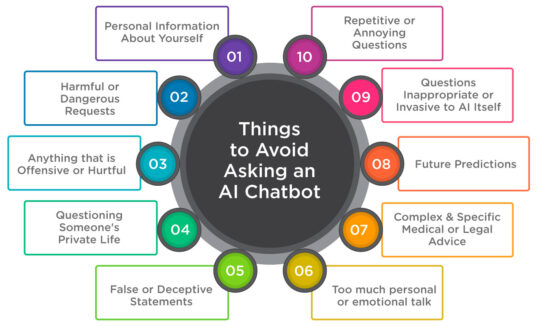Artificial intelligence (AI) chatbots, such as ChatGPT, have become a regular part of our daily lives. It is helpful to get information easily without spending time searching, solves any problem, and is also useful for casual conversations. But just because these chatbots are smart, it does not mean they can answer or respond to everything. There are a few things that every user should know what to not ask or tell AI chatbots. In this blog, we are going to talk about 10 such things that one should know, while using Chat GPT or any other chatbot.
What is an AI Chatbot?
An AI chatbot is a computer program that interacts with people either through text or voice. It uses artificial intelligence to process questions and give suitable answers. Thus, it is helpful in tasks such as customer service, information searching, or even just casual chatting. It is almost like chatting with a smart robot online.
For example, as per resources, the global chatbot market is estimated to reach a CAGR of 23.3% in 2028.
Things to Avoid Asking an AI Chatbot
1. Personal Information About Yourself
AI chatbots are good helpers, but you should be careful about what you share with them. Never give out your full name, address, contact information, email, financial information, or home address. Although some AI systems are designed to keep your data safe, there is always a little risk. So, it is best to keep private information to yourself when chatting with AI.
2. Harmful or Dangerous Requests
AI chatbots are programmed to deny any dangerous, illegal, or harmful requests. These chatbots do not assist you in harming yourself or others. They also cannot assist you in breaking the law. In addition, please remember that these chatbots are designed in a way that is ethically compliant and are unable to aid with anything bad or dangerous.
3. Anything that is Offensive or Hurtful
AI chatbots, like ChatGPT, are developed with filters that avoid the usage of language unless it involves offensive words. But this does not mean you force chatbots to use bad words or ask them to tell you an offensive joke. This should never be done. Just like how you wouldn’t speak in a hurtful way to other people, it is important to keep the conversation respectful and kind. Even though these chatbots don't feel pain, it is essential to develop the habit of speaking kindly and politely.
4. Questioning Someone's Private Life
One should avoid asking AI chatbots about any celebrities or famous public figures without first getting consent to do so. Chatbots can never be expected to know about or reveal personal facts regarding someone's life. Questions regarding one's relationships, private matters, and sensitive subjects should never be asked.
5. False or Deceptive Statements
Remember that chatbots are based on data and work by predicting and generating answers based on what they know. If you tell a chatbot something that is completely false or misleading, it may give you incorrect information. Instead of trying to trick the system, use chatbots to help you get real, helpful, and accurate answers. Trying to test the chatbot with lies can also cause confusion.
6. Too much personal or emotional talk
Chatbots can answer emotional language but are not trained to give one emotional support as a therapist or counselor does. Talking to a human being who actually cares for a person when down or upset will be more appreciated than speaking with a chatbot. It could give one general comfort, but it cannot replace the relationship and professional touch in the issue of mental health.
7. Complex and Specific Medical or Legal Advice
AI chatbots are not physicians or lawyers. They are programmed to give general information, but they cannot offer professional advice. Asking for specific advice on health issues or legal matters should be avoided. If you have a serious question about your health or legal concerns, it is always best to consult a licensed professional who can give you accurate advice.
8. Future Predictions
Although AI may give educated guesses based on present data, it does not know what the future is. It cannot predict anything, such as lottery numbers, what will happen in an event, or what is going to happen next in the world. The AI models are not psychic and cannot predict the future. Questions about what is going to happen next are outside the realm of their capabilities.
9. Questions Inappropriate or Invasive to AI Itself
It is very interesting to ask how AI works, but some questions are just too technical, or you are trying to "test" the limits of an AI, and you might not get the answers you expect. Other invasive questions such as "Are you sentient?" or "Do you have feelings?" are not things a chatbot can answer. Chatbots are not designed to have emotions or self-awareness like humans do. They follow instructions, but they do not think or feel. So, asking AI such personal or deep questions doesn't lead anywhere productive.
10. Repetitive or Annoying Questions
It is fine to ask chatbots for clarification. However, asking the same question or trying to bother the chatbot is not helpful anyway. AI chatbots are there to help you but asking the same thing again and again will not deliver greater answers. That will simply be an unnecessary exercise for both you and the chatbot which may even produce poorer responses.
Use Chatbots Responsibly!
AI chatbots like ChatGPT are very impactful tools that can make lives easier in lots of ways, from answering questions to giving good advice. But it is necessary to use them properly and responsibly. It should be everyone's duty to request with respect and not demand personal, harmful, or inappropriate information. AI can be of great help, but the other thing is that it has boundaries where it is impossible to address certain things that occur.
With these simple guidelines in mind, it should be less likely for people to have a somewhat positive and secure experience with the AI chatbots. Keep it respectful, keep it relevant, and always prioritize your privacy and safety.
To learn more about AI, visit us at WisdomPlexus!
FAQ
Where are chatbots used the most?
Ans. Chatbots are most commonly used in customer service, helping businesses answer questions and solve problems quickly. They are also used in websites, apps, and social media platforms to assist users.
What are the most popular chatbots?
Ans. Some of the most popular chatbots are Siri, Google Assistant, Alexa, and ChatGPT. These are widely used for tasks like voice commands, answering questions, and managing daily activities.
How are chatbots used in real life?
Ans. In real life, chatbots are used for customer support, booking appointments, shopping, and even in education to help students with learning. They are also found in virtual assistants for smart devices at home.
What can ChatGPT do?
Ans. ChatGPT can help with answering questions, writing essays, solving problems, giving recommendations, and offering advice. It can also assist with creative tasks like writing stories or brainstorming ideas.
Recommended For You:
Understanding the Threat of Fake Follower Bots on Social Media





